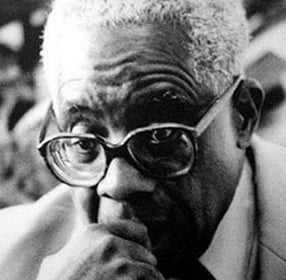Notebook of a Return to the Native Land [Excerpt]
At the end of daybreak ...
Beat it, I said to him, you cop, you lousy pig, beat it,
I detest the flunkies of order and the cockchafers of hope.
Beat it, evil grigri, you bedbug of a petty monk. Then I turned
toward paradises lost for him and his kin, calmer than the face
of a woman telling lies, and there, rocked by the flux of a
never exhausted thought I nourished the wind, I unlaced the
monsters and heard rise, from the other side of disaster, a
river of turtledoves and savanna clover which I carry forever
in my depths height-deep as the twentieth floor of the most
arrogant houses and as a guard against the putrefying force
of crepuscular surroundings, surveyed night and day by a cursed
venereal sun.
At the end of daybreak burgeoning with frail coves, the hungry
Antilles, the Antilles pitted with smallpox, the Antilles dyn-
amited by alcohol, stranded in the mud of this bay, in the dust
of this town sinisterly stranded.
At the end of daybreak, the extreme, deceptive desolate eschar
on the wound of the waters; the martyrs who do not bear witness;
the flowers of blood that fade and scatter in the empty wind
like the screeches of babbling parrots; an aged life mendacious-
ly smiling, its lips opened by vacated agonies; an aged poverty
rotting under the sun, silently; an aged silence bursting with
tepid pustules,
the awful futility of our raison d’être.
At the end of daybreak, on this very fragile earth thickness
exceeded in a humiliating way by its grandiose future—the vol-
canoes will explode, the naked water will bear away the ripe
sun stains and nothing will be left but a tepid bubbling pecked
at by sea birds—the beach of dreams and the insane awakening.
At the end of daybreak, this town sprawled-flat, toppled from
its common sense, inert, winded under its geometric weight of
an eternally renewed cross, indocile to its fate, mute, vexed
no matter what, incapable of growing with the juice of this
earth, self-conscious, clipped, reduced, in breach of fauna
and flora.
Excerpted from “Notebook of a Return to the Native Land” by Aimé Césaire, translated by Clayton Eshleman and Annette Smith. Copyright © 2001 by Aimé Césaire. Used with permission by Wesleyan University Press. All rights reserved.

